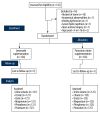Potassium Citrate is Better in Reducing Salt and Increasing Urine pH than Oral Intake of Lemonade: A Cross-Over Study
- PMID: 29605825
- PMCID: PMC5894568
- DOI: 10.12659/msm.909319
Potassium Citrate is Better in Reducing Salt and Increasing Urine pH than Oral Intake of Lemonade: A Cross-Over Study
Abstract
BACKGROUND Urine solute supersaturation leads to the formation of urinary tract caliceal stones. Many parameters can be involved in the supersaturation of solutes in urine, such as pH. Uric acid has pKa ≤5.5, and it is solubilized at pH ≥5.5. The objective of the study was to evaluate the effects of potassium citrate and lemonade supplementation in pediatric patients with urolithiasis. MATERIAL AND METHODS A total of 126 children who had lower ureteral stones calculi and fragments with severe colic pain participated in this cross-over study. Children drank lemonade (2 mEq/kg/day citrate) in 3 divided doses for 5 days. After a 15-day washout period, children drank 2 mEq/kg/day of potassium citrate in 3 divided doses for 5 days. On the sixth of the day of individual intervention, a 24-h urine sample was collected and evaluated for pH, urine volume, citrate level, uric acid level, magnesium, phosphorus, potassium, and sodium. Urinary parameters for 1-day urine collection measurements after each supplementation were compared with baseline using the Mann-Whitney test following Tukey post hoc test at 95% confidence level. RESULTS Potassium citrate supplementation resulted in reduction of sodium concentration (p=0.0337; q=3.76) and increased pH of urine (p=0.0118; q=4.389). However, urine volume, citrate level, and uric acid level, as well as elemental magnesium, phosphorus, and potassium, remained unchanged after 5 days of supplementation with potassium citrate or lemonade. CONCLUSIONS Potassium citrate supplementation is an effective therapy for preventing pediatric urolithiasis, with acceptable adverse effects.
Conflict of interest statement
None.
Figures
References
-
- Matlaga BR, Schaeffer AJ, Novak TE, Trock BJ. Epidemiologic insights into pediatric kidney stone disease. Urol Res. 2010;38(6):453–57. - PubMed
-
- Fulgham PF, Assimos DG, Pearle MS, Preminger GM. Clinical effectiveness protocols for imaging in the management of ureteral calculous disease: AUA technology assessment. J Urol. 2013;189(4):1203–13. - PubMed
-
- Koff SG, Paquette EL, Cullen J, et al. Comparison between lemonade and potassium citrate and impact on urine pH and 24-hour urine parameters in patients with kidney stone formation. Urology. 2007;69(6):1013–16. - PubMed
-
- Elmacı AM, Ece A, Akın F. Clinical characteristics and metabolic abnormalities in preschool-age children with urolithiasis in southeast Anatolia. J Pediatr Urol. 2014;10(3):459–99. - PubMed
Publication types
MeSH terms
Substances
LinkOut - more resources
Full Text Sources


